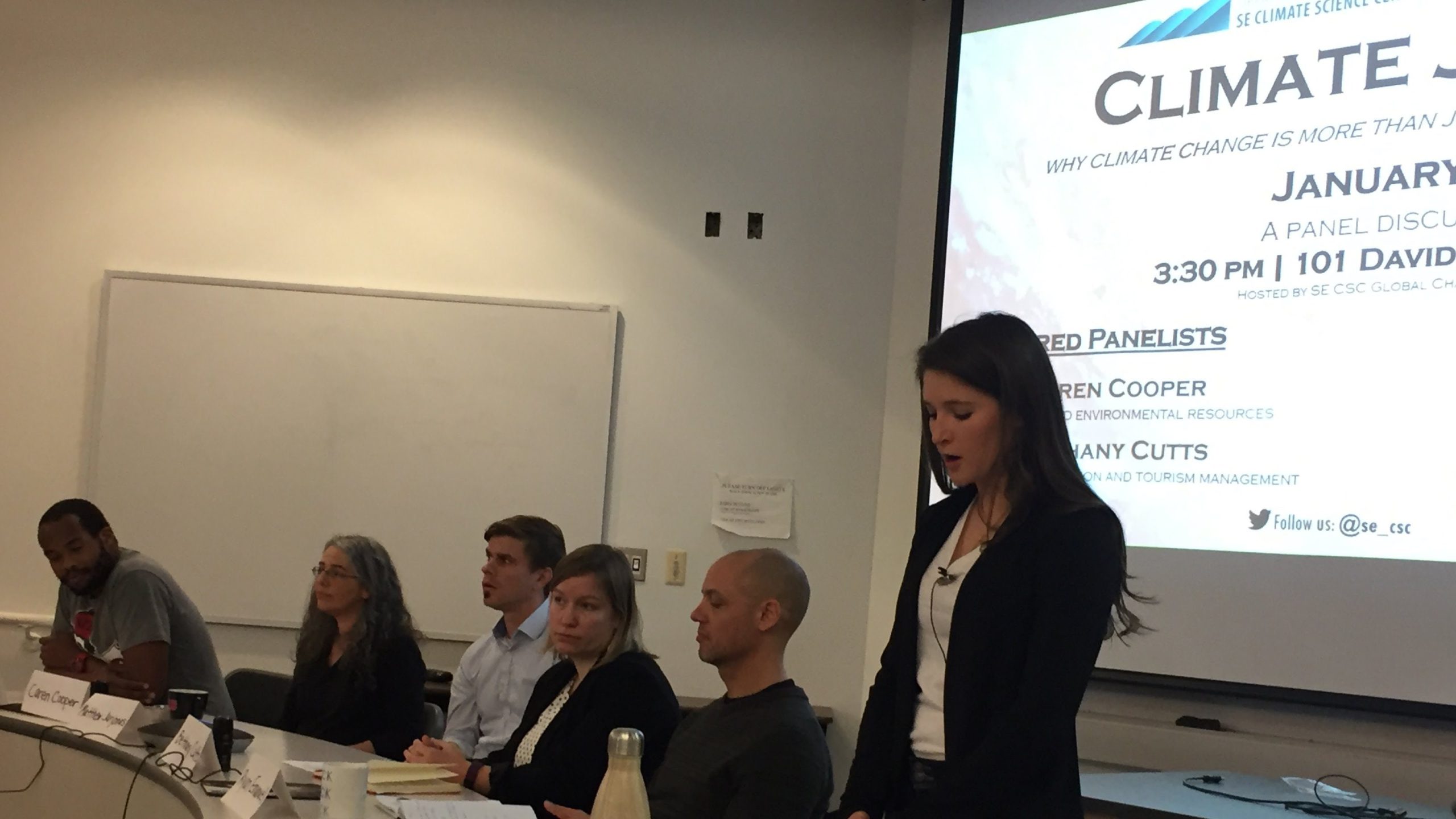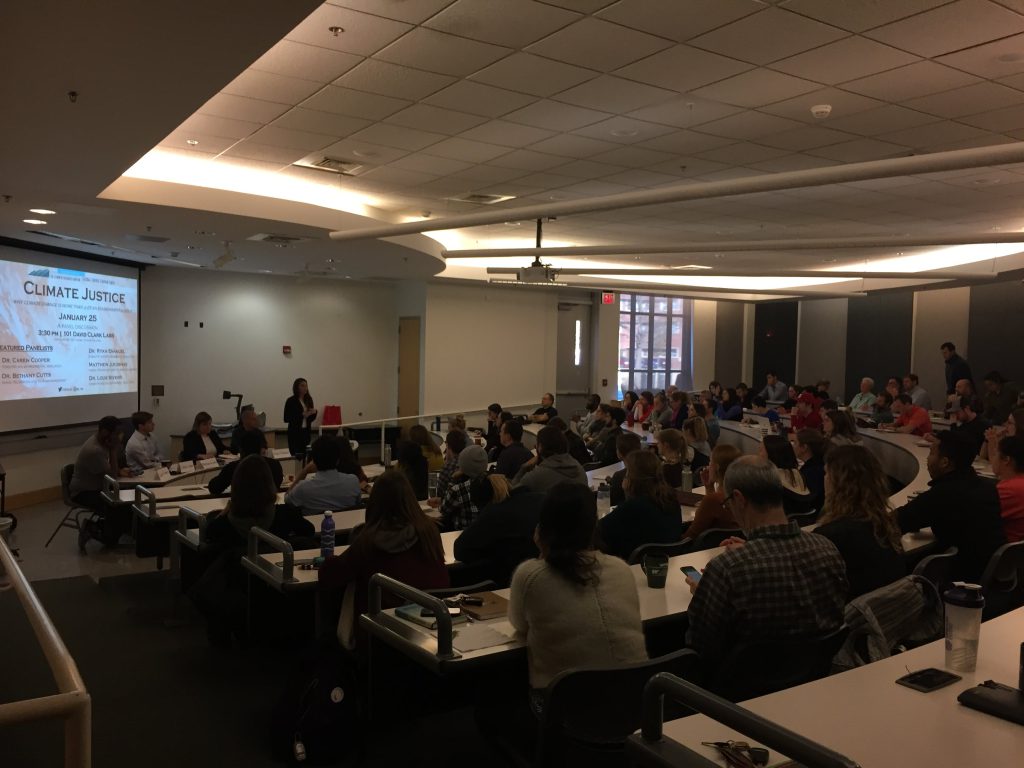Panelists Gather for a Discussion on Climate Justice


This post was written by Mike Madden, Spring 2018 Global Change Fellow.
On January 25, the Global Change Fellows of 2018 held their first seminar, entitled “Climate Justice: Why Climate Change is More Than Just an Environmental Issue”. The well-attended discussion featured scholars from the Forestry and Environmental Resources and the Parks, Recreation, and Tourism Departments at NC State University.
Panelists touched upon a variety of topics, including the disproportionate impacts of climate change on poor and marginalized communities, the responsibility of academics to engage their communities, and the roles that citizens, governments, and private enterprise can play in recognizing and overcoming oppression.
“[Climate justice] is about giving a voice to people who don’t normally have voices when decisions are made about the environment … I think you can make an argument that a lot of the oppression we see in social populations are mirrored by how we oppress the environment … If you look at the distribution of income and environmental harms, you can lay the maps on top of each other.” said Dr. Louie Rivers, Assistant Professor in the Department of Forestry and Environmental Resources.
Dr. Bethany Cutts, Assistant Professor in the Department of Parks, Recreation, and Tourism, connected environmental justice with the recognition of oppression. “Environmental justice kind of emerged as a social movement and a field of scholarship at the same time. People looked and found patterns of disproportionate burdens in low-income communities of color across the United States in terms of where undesirable land uses and toxic facilities were located.”
Panelists concurred that environmental decisions are often made without taking into consideration the needs of those who would be directly affected by those changes.
“… really the [environmental] problems that are local happen because of so many things outside of that location,” said Dr. Caren Cooper, Associate Professor in the Department of Forestry and Environmental Resources.
Matthew Jurjonas, a PhD student in the Parks, Recreation, and Tourism Department, stated “… In a lot of these cases, these are minority communities that weren’t at the table when the decisions were made.” Offering an example, Jurjonas talked about a highway construction project that went through one of his study sites. “When they put the highway through, it changed the hydrology … on the South side of the town, African Americans had a lot more flooding impacts after that construction project.”
 Some panelists commented on the disparity of impacts amongst high and low emitters. “Some of the counties in the [Albemarle–Pamlico] Peninsula have the highest rates of poverty in the state, and of course income is really correlated to emissions, so you can imagine that a lot of these folks are some of the lowest emitters in terms of climate change, and subsequently they will be experiencing some of the most impacts of sea-level rise,” said Jurjonas.
Some panelists commented on the disparity of impacts amongst high and low emitters. “Some of the counties in the [Albemarle–Pamlico] Peninsula have the highest rates of poverty in the state, and of course income is really correlated to emissions, so you can imagine that a lot of these folks are some of the lowest emitters in terms of climate change, and subsequently they will be experiencing some of the most impacts of sea-level rise,” said Jurjonas.
Dr. Cutts expanded this more broadly. “I think on a global scale, it is the less affluent countries that will have less capacity for adaptation and resilience relating to climate change impacts. Small island nations will feel disproportionate impacts and burdens. There are pretty wide differences in terms of how much an individual, or even a nation, is consuming versus the impacts it receives.”
Dr. Ryan Emanuel, Associate Professor in the Department of Forestry and Environmental Resources and citizen of the Lumbee Tribe, voiced the responsibilities of academics, and a larger discussion on solutions commenced later.
“As academics, we have a responsibility to make sure that our work includes and engages these communities in appropriate and meaningful ways … I was brought up with a value on education – education for the purpose of returning and doing things to help my people … my work today partners with these tribes, helping them address some of the pressing and environmental issues in their communities, which often indirectly involved impacts of climate change.”
Dr. Cooper highlighted the importance of being proactive. “I look at my ornithology background, and I look at the maps … We have extensive knowledge and amazing detail on bird populations across the country. If we had that [level of] information on contaminants and other hazards and risks … we might detect problems before a local community might even be able to organize and get attention for it. Why don’t we have that?”
When asked what people could do collectively to stop the perpetuation of climate injustice, panelists emphasized the importance of considering local and regional histories. Dr. Emanuel began this line of reasoning.
“I think about places like the predominantly African American town of Princeville [North Carolina]. You could say, “well if your town floods all the time, just move,” but you have to understand why that town exists where it does. The only lands available for the freed slaves, immediately after the Civil War, were these low-lying flood plains across the river from the high town on the bluffs … We have to acknowledge that we have these physical processes, but there is also this history … we can’t just say “you have to move” to make it better.”
Dr. Rivers added, “After apartheid, South Africa had truth and reconciliation, [and] they could address what happened during this horrible period. South Africa still has major problems, but we never had truth and reconciliation about our history, especially about slavery, and how that impacts how the world operates today. Until we acknowledge that history and how it shaped our world today, I don’t know how we can shape any real solutions to our problems.”
Dr. Cooper made a similar comment earlier in the seminar. “I don’t think we can achieve sustainability if there is not justice.”
Panelists added other steps citizens could take.
“Be in the world, but not of the world,” said Dr. Rivers. “Be in these political systems, be in these agencies, but don’t be of them. We need people in these agencies and systems that actually care about oppression – you are not going to fix it by just protesting all the time. You need to actually be part of these systems and constantly looking out for oppression.”
Mr. Jurjonas considered personal behaviors. Referencing a paper entitled “The Climate Mitigation Gap” by Seth Wynes and Kimberly Nicholas, Jurjonas recommended lifestyle changes that are more effective in reducing carbon footprints. “In the grand scheme of things, [actions like] recycling or changing your lightbulbs are very important collectively, but as an individual it’s not going to lower your carbon footprint that much, and some of the top things on the list were living car free or avoiding a flight – those are going to be much bigger reductions in your metric tons per year then the lightbulbs.”
Dr. Cutts considered the roles of market-based initiatives. “Do some dummy checks. Does this [proposal] create disproportionate burdens for communities that are already experiencing inequities or injustices? Does it remediate any existing inequities or injustices? Does it put solutions, innovations, and wealth into the hands of people who already have the capacity to achieve change or adapt to changing conditions through other means?”
***
The Global Change Fellows thank the panelists for their contributions. The Global Change Fellows at NC State University host seminars monthly. Upcoming seminars will occur on the following dates: February 22, March 29, and April 12.
- Categories: